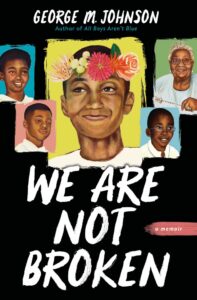 Review By: Anonymous
Review By: Anonymous
Published: 2021
Genre(s): Memoir, Biography
Audience: Grades 10 to 12, Adult
Content Warnings: Domestic abuse, sexual abuse, discussions of racism
Goodreads Link: We Are Not Broken
Publisher’s Summary:
New memoir from George M. Johnson that celebrates Black boyhood and brotherhood in all its glory! This is the story of George, Garrett, Rall, and Rasul — four children raised by Nanny, their fiercely devoted grandmother. The boys hold each other close through early brushes with racism, memorable experiences at the family barbershop, and first loves and losses. And with Nanny at their center, they are never broken. Complete with letters from the grandchildren to their beloved matriarch and a full color photo insert.
Review:
I picked up We are Not Broken because I have been making an effort to read more nonfiction books this year and searching for titles to help diversify my classroom library. Thriftbooks was having a sale, so I ended up impulse buying We Are Not Broken because it was listed tagged as something like YA, race, and LGBTQ plus and being a memoir felt like a good opportunity to add some authentic voices on these subjects into my classroom. I have not read Johnson’s first book, All Boys Aren’t Blue, but will certainly be adding it to my to be read pile after having finished We Are Not Broken. Johnson is very clear in the memoir that this is a story about growing up as a black boy and the specific ways that blackness plays into family dynamics. Johnson’s reflections showcase the ways in which adults in their life, especially their grandmother, tried their hardest to teach the boys how to be ready for a world that will often be adversarial towards them, while still fostering confidence and a strong sense of family ties. In tandem with Johnson’s exploration of race and family, they also talk about their journey with being nonbinary and how the support of their family was integral to feeling ready to write this memoir. We are Not Broken remains true to the thesis outlined by the title. The memoir is as much a story of Johnson’s upbringing as it is the story of the woman who raised them and their cousins. Their grandmother, or Nanny. Each chapter starts with a Nannyism, a piece of wisdom passed on by Johnson’s grandmother, that mirrors the idea explored in the chapter. One particularly enjoyable chapter is centered around the Nannyism If you use measuring cups, your food will taste measured. Taste your food while you cook it and adjust accordingly. The section that follows is a hysterical account of a Thanksgiving that goes awry when Nanny fails to follow her own advice. This is an interesting deviation from the format of the rest of the memoir, where Johnson explores Nanny not taking her own advice rather than following the four boys like much of the book does. The story of Thanksgiving becomes a poignant segway into the narrator’s grief at the passing of their grandmother over a later holiday season. I also found Johnson’s inclusion of pieces by some of his cousins to be an effective addition to the text. Often in memoirs the events are presented in a very onesided way just as a convention of the genre, but Johnson allows space for the authentic voices of his cousins to come through in the text. Continuing the idea of centering the text around their grandmother, every few chapters a cousin writes a tribute to Nanny. This was a great way of showing the familial grief alongside Johnson’s private grief. It also infused the text with a level of experimentation in form. In addition to adding in more voices in a way most memoirs usually do not. Each cousin uses a different form, with some writing poems or letters while other cousins wrote essays or eulogies for Nanny. I felt this gave the memoir space for a fuller exploration of the family dynamics Johnson wrote about as we got to hear from some of the people mentioned in the text in their own voices.


